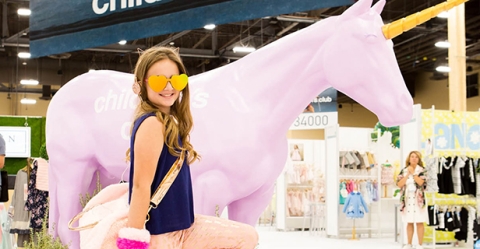Tariffs Dispute and Smart Fabrics Were the Talk of MAGIC’s February Marketplace

Smart fabrics, sustainable fashion and the ongoing tariffs dispute were only a few of the hot topics at this year’s MAGIC, the biannual fashion trade show that brought about 80,000 attendees to Las Vegas Feb. 4-7.
Comprising a dozen shows within the show, MAGIC covers nearly every aspect of the apparel, accessories, pool wear and footwear industries. This month’s event marked the last time the show will be collocated at both Las Vegas Convention Center and Mandalay Bay Convention Center (in case you missed it, learn more about this big show announcement here.)
At SOURCING at MAGIC, attendees could explore a microfactory complete with a body scanner, virtual fittings and direct-to-fabric printing. They could also touch jeans dyed with waterless technology, and get a deeper understanding of the impact fast fashion has on the planet through the X Ray Fashion virtual reality experience.
The ongoing tariffs dispute between the U.S. and China was evident in a recharted floor plan, which featured fewer Chinese manufacturers but also gave an opportunity to potentially new sourcing destinations.
“Without a doubt, the talk of a trade war and general feeling of a battle between President Trump and President Xi had made factory owners in China feel hesitant about going to February Sourcing,” said Christopher Griffin, fashion group president of international business development and president for SOURCING at MAGIC.
He added, “We’re feeling it but we had a lot of China in our show, so I don’t think it was sustainable.”
The dispute was certainly good news for exhibitor Eugene Havemann, CEO of Madagascar Garments.
“It has certainly opened doors for us,” Havemann said. “There’s tremendous opportunity for us from the job growth perspective. Our challenge is lead time, but as the market grows, there will be more the need to go vertical. We already have several U.S. customers as the result of the show.”
Over at the denim exhibit, it was hard not to be impressed by smart jeans that combine Coolmax and Thermaline technologies, which makes them cool in the summer and warm in the winter.
“With new technologies and new chemicals, you can do anything,” said Patricia Medina, with Mexico-based Aztex Trading.
Much of the exhibit focused on sustainable practices, such Jeanologia’s e-flow technology that delivers dye to fibers by nanoparticles, a process that saves 95 percent of water and has no waste.
At PROJECT, attendees shopped for ’80s glamor with power edges and iridescent materials; warm, cozy colors of the new “slow living” movement; and unique takes on classics.
One such idea was presented by Japanese company Johnny & Jessy that makes shoes with interchangeable soles. Upper and lower parts attach with a zipper.
“We originally created them for business [travelers] so that they don’t have to carry separate pairs on a trip, but in America, people appreciate the unusual design concept,” said Yusuke Ando, the company’s founder.
Japan remains an important market for MAGIC with its PROJECT Tokyo show. Originally launched in 2016, it has evolved into an event developed specifically for that region — thanks, to a big degree, to the new ownership by Informa.
“[Informa has] a ‘think big, act small’ mentality,” Griffin said. “If you’re in the fashion space, you have to be nimble — it marries up nicely.”
He continued, “Informa was completely supportive of what we needed. We changed venues; dates; rebranded the name; shifted from a broad mix of merchandise to very curated, advanced contemporary brands and a lot of premium denim; no Kids and no SOURCING [show sections].”
Griffin said Informa will continue to expand into Asia, pursuing opportunities in China, Korea and Singapore, among other areas.
MAGIC’s summer marketplace will return to the LVCC Aug. 12-14.
Don’t miss any event-related news: Sign up for our weekly e-newsletter HERE and engage with us on Twitter, Facebook, LinkedIn and Instagram!


Add new comment